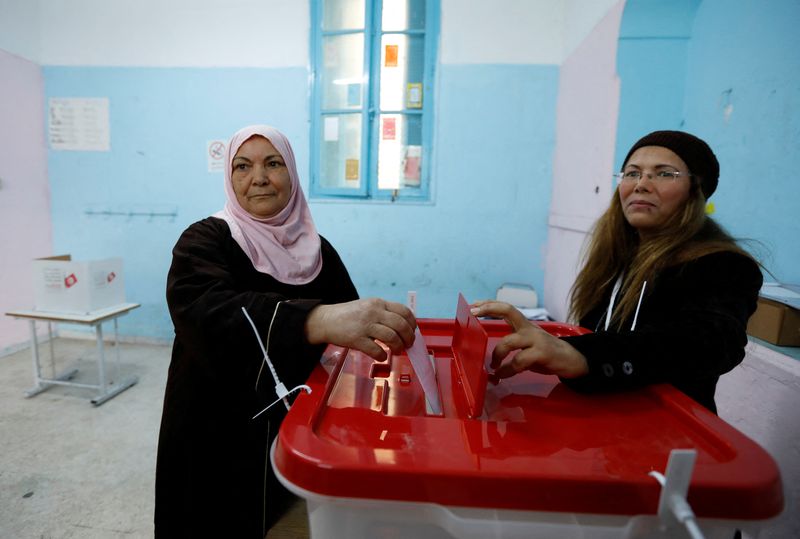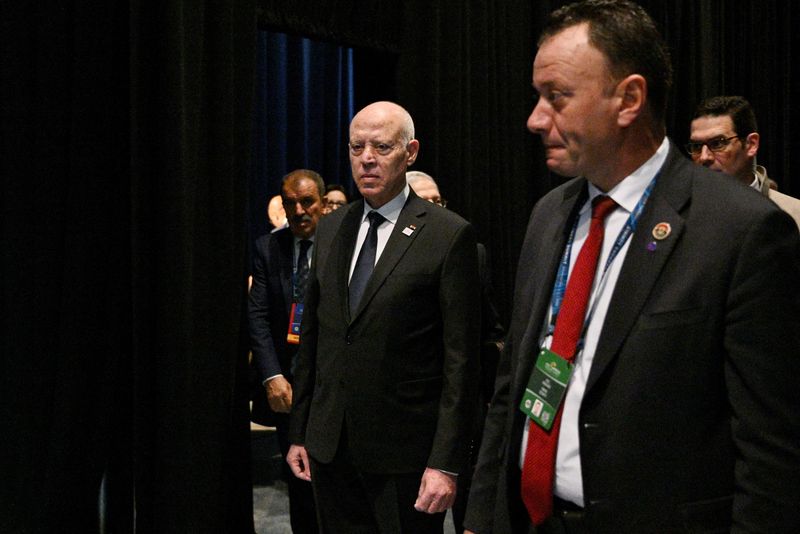By Tarek Amara and Angus McDowall
TUNIS (Reuters) -Only 8.8% of Tunisian voters cast ballots in Saturday's parliamentary elections, authorities announced, after most political parties boycotted the vote as a charade aimed at shoring up President Kais Saied's power.
The provisional turnout figure is below November's 9.8% inflation rate, underscoring the economic pressures that have left many Tunisians disillusioned with politics and infuriated with their leaders.
The main opposition coalition the Salvation Front said the very low turnout meant Saied had no legitimacy and should quit office, calling for "massive protests and sit-ins".
Another major party, the Free Constitutional party led by Abir Moussi who is a supporter of former President Zine El Abidine Ben Ali, called on President Saied to step down.
"We call to announce the vacancy in the position of the president and to call for early presidential elections ... more than 90% of Tunisians rejected Saied's plan", Moussi said.
"Why should I vote? ... I am not convinced by this election," said Abdl Hamid Naji as he sat near a polling station on Saturday morning. "In the previous elections, I was the first to arrive... But now I'm not interested."
The election comes 12 years to the day after vegetable seller Mohamed Bouazizi set himself on fire in an act of protest that sparked the Arab Spring and brought democracy to Tunisia.
But that democratic legacy has been thrown into ever more doubt by political changes made by Saied since he shut down the previous, more powerful parliament in July 2021 and moved to rule by decree, amassing ever more power.
Saied, a former law lecturer who was a political independent when elected president in 2019, wrote a new constitution this year diluting parliament's powers to make it subordinate to the presidency with little sway over government.
The president has presented his changes as necessary to save Tunisia from years of political paralysis and economic stagnation, and on Saturday morning he urged voters to take part in the election.
However, few Tunisians that Reuters has spoken to over recent weeks said they were interested, seeing the new parliament as irrelevant and the vote as a distraction from an economic crisis wrecking their lives.
Speaking late on Saturday, opposition Salvation Front chief Nejib Chebbi called for a political transition, with presidential elections and a national dialogue.
Protests against Saied have at times drawn more than 10,000 demonstrators but have more often been in the hundreds and the opposition remains fragmented.
Questions over legitimacy may become a problem for the president as his government wrestles with implementing unpopular economic reforms such as subsidy cuts to secure an international bailout of state finances.
The economy shrank by more than 8% during the COVID-19 pandemic and the recovery has been slow. Some basic foodstuffs and medicines have disappeared from shelves and ever more Tunisians are braving the dangers of an illicit Mediterranean crossing to seek a new life in Europe.
PARTIES ABSENT
The political parties that dominated the previous parliament, elected in 2019 with a turnout of about 40%, have accused Saied of a coup for his shutdown of parliament last year and say he has instituted one-man rule.
Under Saied's new electoral law, which he passed by decree, political parties would have had a far smaller role in the election even if they had taken part. Party affiliation was not included on ballot papers next to candidate names.
The electoral commission head Farouk Bouasker, who announced the turnout figure, described it as "modest but not shameful", ascribing it to the new voting system and a lack of paid election campaigning.
At one polling station voter Faouzi Ayarai had said she was optimistic about the new parliament. "These elections are an opportunity to fix the bad situation left by others over the past years," she said.
But I Watch, a non-governmental watchdog organisation formed after the 2011 revolution, said the new parliament had been "emptied of all powers".

With the main parties absent, a total of 1,058 candidates, only 120 of them women, were running for 161 seats.
For 10 of those, seven in Tunisia and three decided by expatriate voters, there was just one candidate. A further seven of the seats decided by expatriate voters had no candidates running at all.
